Analyzing Customer Service Quality and Management at Cameron Hotel
VerifiedAdded on 2020/05/01
|8
|1873
|35
Report
AI Summary
This report analyzes the customer service quality management at Cameron Hotel, focusing on a significant service failure involving a premium client, Mr. Jones. The report details the issues of inadequate service delivery, including problems with meeting room arrangements, food requests, and room reservations, leading to Mr. Jones canceling his bookings due to the sales manager's negligence. The consequences of this failure are explored, including the firing of the sales manager and potential revenue and reputational loss for the hotel. The report further evaluates the seriousness of the incident within the hospitality industry, emphasizing the importance of customer satisfaction and the impact of negative feedback. Finally, the report proposes strategies for improving customer service quality, such as staff training, performance measurement, and enhancing facilities, to prevent similar issues and maintain a high level of service. The report emphasizes the need for proactive management and a customer-centric approach to ensure client satisfaction and business success.
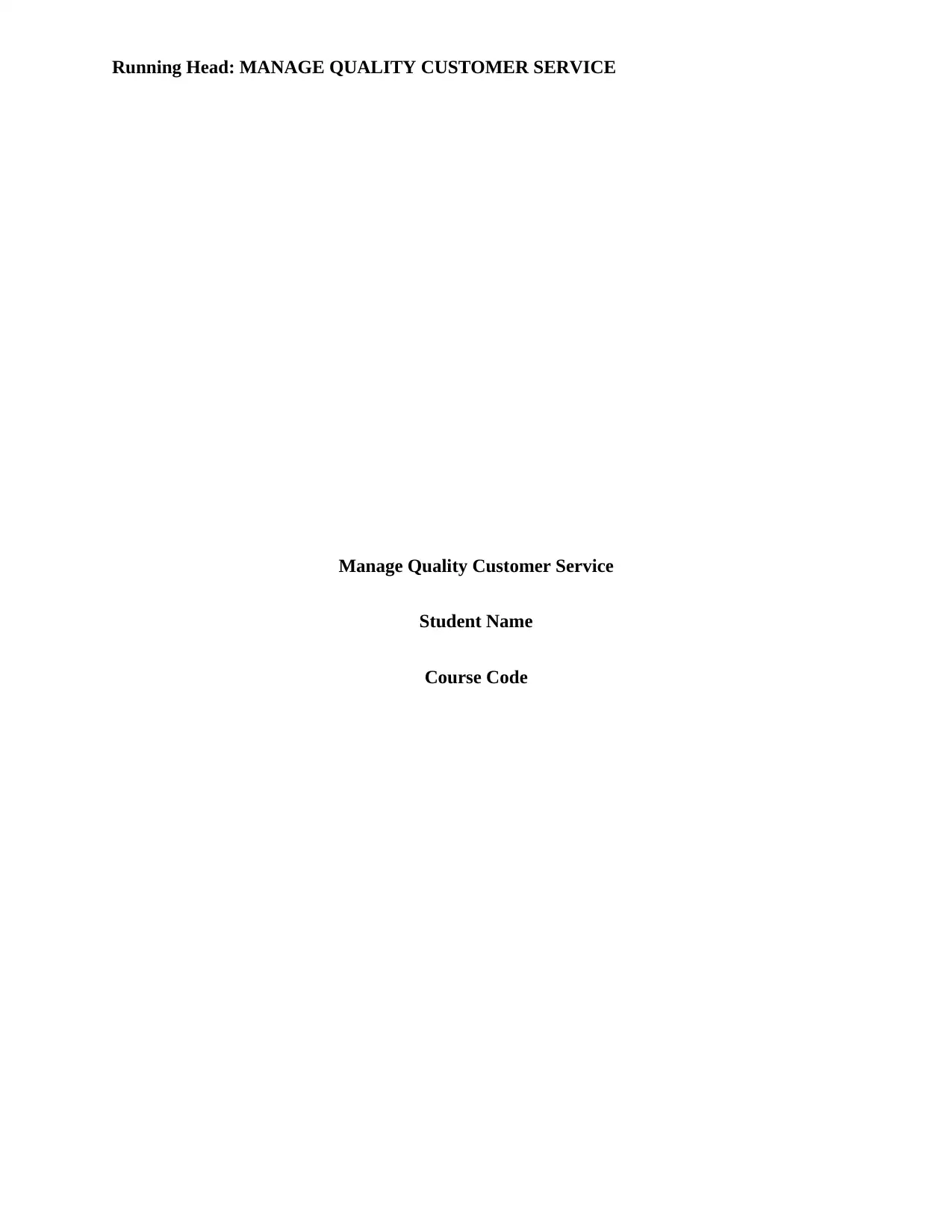
Running Head: MANAGE QUALITY CUSTOMER SERVICE
Manage Quality Customer Service
Student Name
Course Code
Manage Quality Customer Service
Student Name
Course Code
Paraphrase This Document
Need a fresh take? Get an instant paraphrase of this document with our AI Paraphraser
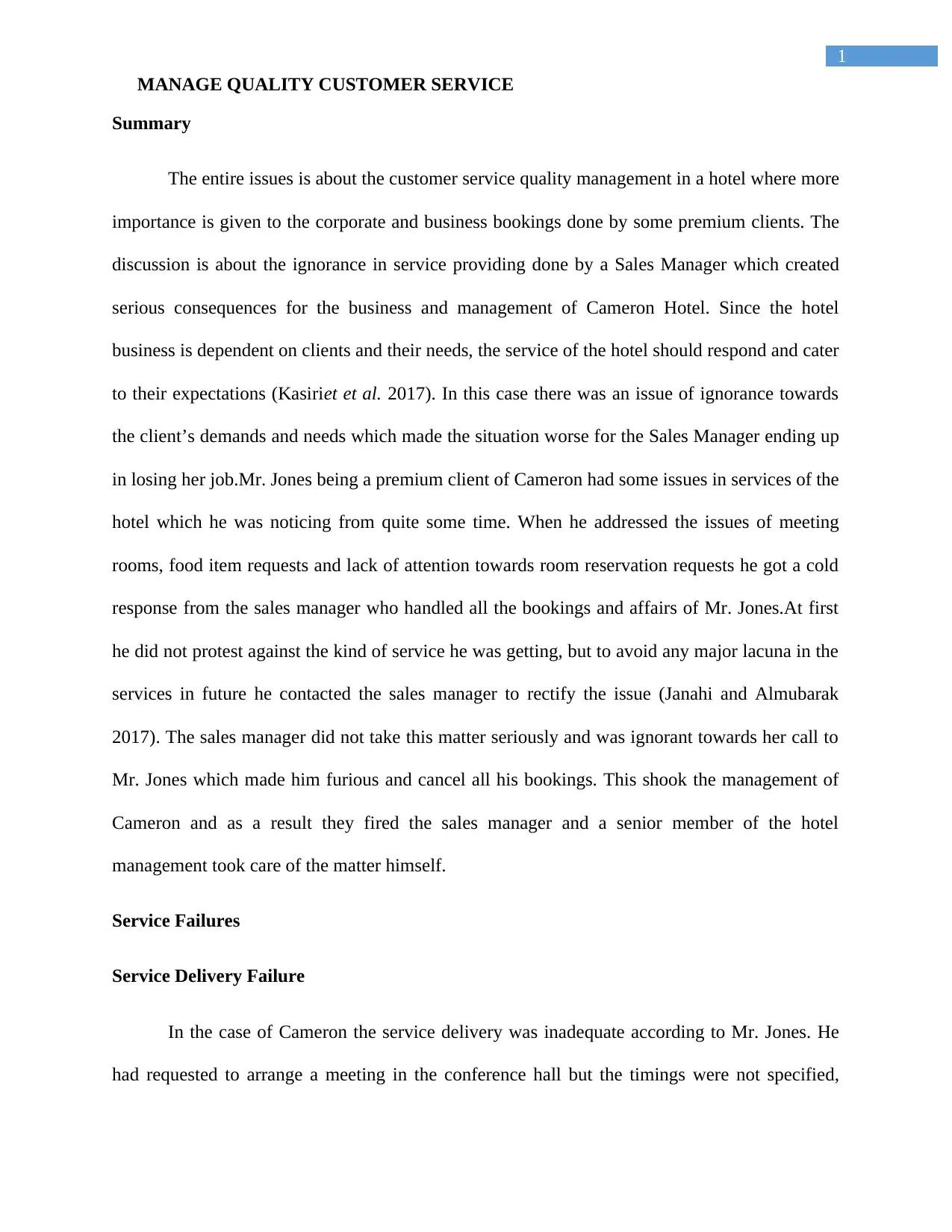
1
MANAGE QUALITY CUSTOMER SERVICE
Summary
The entire issues is about the customer service quality management in a hotel where more
importance is given to the corporate and business bookings done by some premium clients. The
discussion is about the ignorance in service providing done by a Sales Manager which created
serious consequences for the business and management of Cameron Hotel. Since the hotel
business is dependent on clients and their needs, the service of the hotel should respond and cater
to their expectations (Kasiriet et al. 2017). In this case there was an issue of ignorance towards
the client’s demands and needs which made the situation worse for the Sales Manager ending up
in losing her job.Mr. Jones being a premium client of Cameron had some issues in services of the
hotel which he was noticing from quite some time. When he addressed the issues of meeting
rooms, food item requests and lack of attention towards room reservation requests he got a cold
response from the sales manager who handled all the bookings and affairs of Mr. Jones.At first
he did not protest against the kind of service he was getting, but to avoid any major lacuna in the
services in future he contacted the sales manager to rectify the issue (Janahi and Almubarak
2017). The sales manager did not take this matter seriously and was ignorant towards her call to
Mr. Jones which made him furious and cancel all his bookings. This shook the management of
Cameron and as a result they fired the sales manager and a senior member of the hotel
management took care of the matter himself.
Service Failures
Service Delivery Failure
In the case of Cameron the service delivery was inadequate according to Mr. Jones. He
had requested to arrange a meeting in the conference hall but the timings were not specified,
MANAGE QUALITY CUSTOMER SERVICE
Summary
The entire issues is about the customer service quality management in a hotel where more
importance is given to the corporate and business bookings done by some premium clients. The
discussion is about the ignorance in service providing done by a Sales Manager which created
serious consequences for the business and management of Cameron Hotel. Since the hotel
business is dependent on clients and their needs, the service of the hotel should respond and cater
to their expectations (Kasiriet et al. 2017). In this case there was an issue of ignorance towards
the client’s demands and needs which made the situation worse for the Sales Manager ending up
in losing her job.Mr. Jones being a premium client of Cameron had some issues in services of the
hotel which he was noticing from quite some time. When he addressed the issues of meeting
rooms, food item requests and lack of attention towards room reservation requests he got a cold
response from the sales manager who handled all the bookings and affairs of Mr. Jones.At first
he did not protest against the kind of service he was getting, but to avoid any major lacuna in the
services in future he contacted the sales manager to rectify the issue (Janahi and Almubarak
2017). The sales manager did not take this matter seriously and was ignorant towards her call to
Mr. Jones which made him furious and cancel all his bookings. This shook the management of
Cameron and as a result they fired the sales manager and a senior member of the hotel
management took care of the matter himself.
Service Failures
Service Delivery Failure
In the case of Cameron the service delivery was inadequate according to Mr. Jones. He
had requested to arrange a meeting in the conference hall but the timings were not specified,
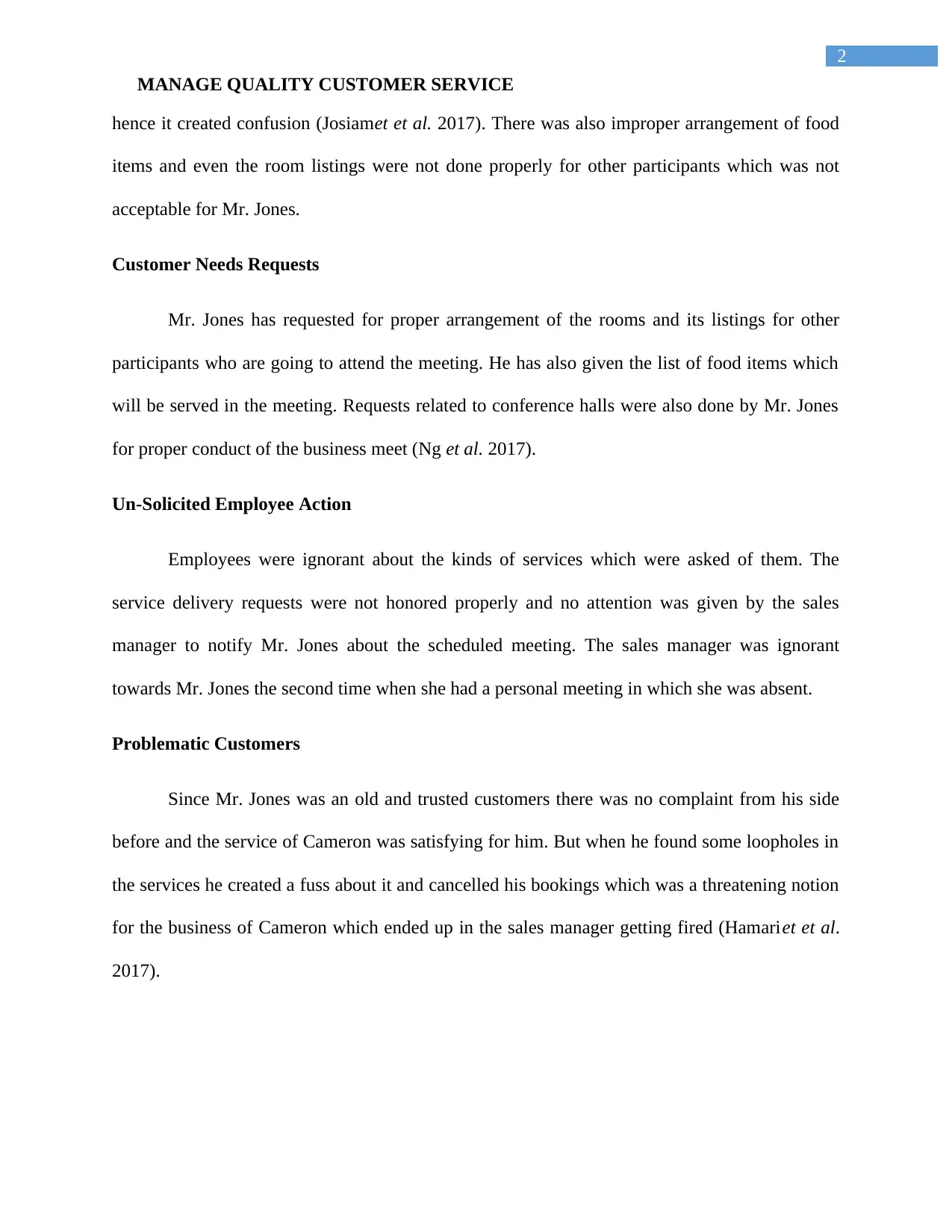
2
MANAGE QUALITY CUSTOMER SERVICE
hence it created confusion (Josiamet et al. 2017). There was also improper arrangement of food
items and even the room listings were not done properly for other participants which was not
acceptable for Mr. Jones.
Customer Needs Requests
Mr. Jones has requested for proper arrangement of the rooms and its listings for other
participants who are going to attend the meeting. He has also given the list of food items which
will be served in the meeting. Requests related to conference halls were also done by Mr. Jones
for proper conduct of the business meet (Ng et al. 2017).
Un-Solicited Employee Action
Employees were ignorant about the kinds of services which were asked of them. The
service delivery requests were not honored properly and no attention was given by the sales
manager to notify Mr. Jones about the scheduled meeting. The sales manager was ignorant
towards Mr. Jones the second time when she had a personal meeting in which she was absent.
Problematic Customers
Since Mr. Jones was an old and trusted customers there was no complaint from his side
before and the service of Cameron was satisfying for him. But when he found some loopholes in
the services he created a fuss about it and cancelled his bookings which was a threatening notion
for the business of Cameron which ended up in the sales manager getting fired (Hamariet et al.
2017).
MANAGE QUALITY CUSTOMER SERVICE
hence it created confusion (Josiamet et al. 2017). There was also improper arrangement of food
items and even the room listings were not done properly for other participants which was not
acceptable for Mr. Jones.
Customer Needs Requests
Mr. Jones has requested for proper arrangement of the rooms and its listings for other
participants who are going to attend the meeting. He has also given the list of food items which
will be served in the meeting. Requests related to conference halls were also done by Mr. Jones
for proper conduct of the business meet (Ng et al. 2017).
Un-Solicited Employee Action
Employees were ignorant about the kinds of services which were asked of them. The
service delivery requests were not honored properly and no attention was given by the sales
manager to notify Mr. Jones about the scheduled meeting. The sales manager was ignorant
towards Mr. Jones the second time when she had a personal meeting in which she was absent.
Problematic Customers
Since Mr. Jones was an old and trusted customers there was no complaint from his side
before and the service of Cameron was satisfying for him. But when he found some loopholes in
the services he created a fuss about it and cancelled his bookings which was a threatening notion
for the business of Cameron which ended up in the sales manager getting fired (Hamariet et al.
2017).
⊘ This is a preview!⊘
Do you want full access?
Subscribe today to unlock all pages.

Trusted by 1+ million students worldwide
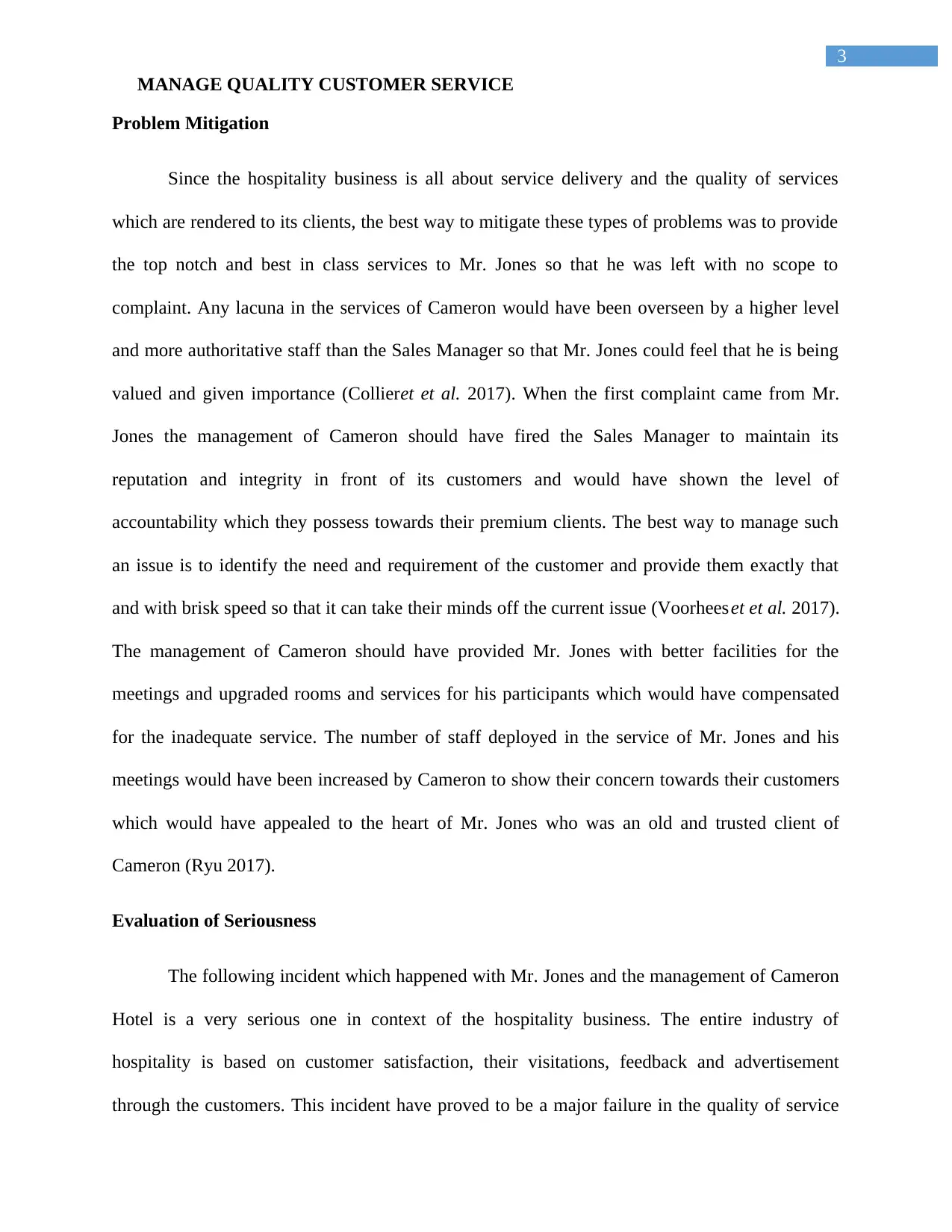
3
MANAGE QUALITY CUSTOMER SERVICE
Problem Mitigation
Since the hospitality business is all about service delivery and the quality of services
which are rendered to its clients, the best way to mitigate these types of problems was to provide
the top notch and best in class services to Mr. Jones so that he was left with no scope to
complaint. Any lacuna in the services of Cameron would have been overseen by a higher level
and more authoritative staff than the Sales Manager so that Mr. Jones could feel that he is being
valued and given importance (Collieret et al. 2017). When the first complaint came from Mr.
Jones the management of Cameron should have fired the Sales Manager to maintain its
reputation and integrity in front of its customers and would have shown the level of
accountability which they possess towards their premium clients. The best way to manage such
an issue is to identify the need and requirement of the customer and provide them exactly that
and with brisk speed so that it can take their minds off the current issue (Voorhees et et al. 2017).
The management of Cameron should have provided Mr. Jones with better facilities for the
meetings and upgraded rooms and services for his participants which would have compensated
for the inadequate service. The number of staff deployed in the service of Mr. Jones and his
meetings would have been increased by Cameron to show their concern towards their customers
which would have appealed to the heart of Mr. Jones who was an old and trusted client of
Cameron (Ryu 2017).
Evaluation of Seriousness
The following incident which happened with Mr. Jones and the management of Cameron
Hotel is a very serious one in context of the hospitality business. The entire industry of
hospitality is based on customer satisfaction, their visitations, feedback and advertisement
through the customers. This incident have proved to be a major failure in the quality of service
MANAGE QUALITY CUSTOMER SERVICE
Problem Mitigation
Since the hospitality business is all about service delivery and the quality of services
which are rendered to its clients, the best way to mitigate these types of problems was to provide
the top notch and best in class services to Mr. Jones so that he was left with no scope to
complaint. Any lacuna in the services of Cameron would have been overseen by a higher level
and more authoritative staff than the Sales Manager so that Mr. Jones could feel that he is being
valued and given importance (Collieret et al. 2017). When the first complaint came from Mr.
Jones the management of Cameron should have fired the Sales Manager to maintain its
reputation and integrity in front of its customers and would have shown the level of
accountability which they possess towards their premium clients. The best way to manage such
an issue is to identify the need and requirement of the customer and provide them exactly that
and with brisk speed so that it can take their minds off the current issue (Voorhees et et al. 2017).
The management of Cameron should have provided Mr. Jones with better facilities for the
meetings and upgraded rooms and services for his participants which would have compensated
for the inadequate service. The number of staff deployed in the service of Mr. Jones and his
meetings would have been increased by Cameron to show their concern towards their customers
which would have appealed to the heart of Mr. Jones who was an old and trusted client of
Cameron (Ryu 2017).
Evaluation of Seriousness
The following incident which happened with Mr. Jones and the management of Cameron
Hotel is a very serious one in context of the hospitality business. The entire industry of
hospitality is based on customer satisfaction, their visitations, feedback and advertisement
through the customers. This incident have proved to be a major failure in the quality of service
Paraphrase This Document
Need a fresh take? Get an instant paraphrase of this document with our AI Paraphraser
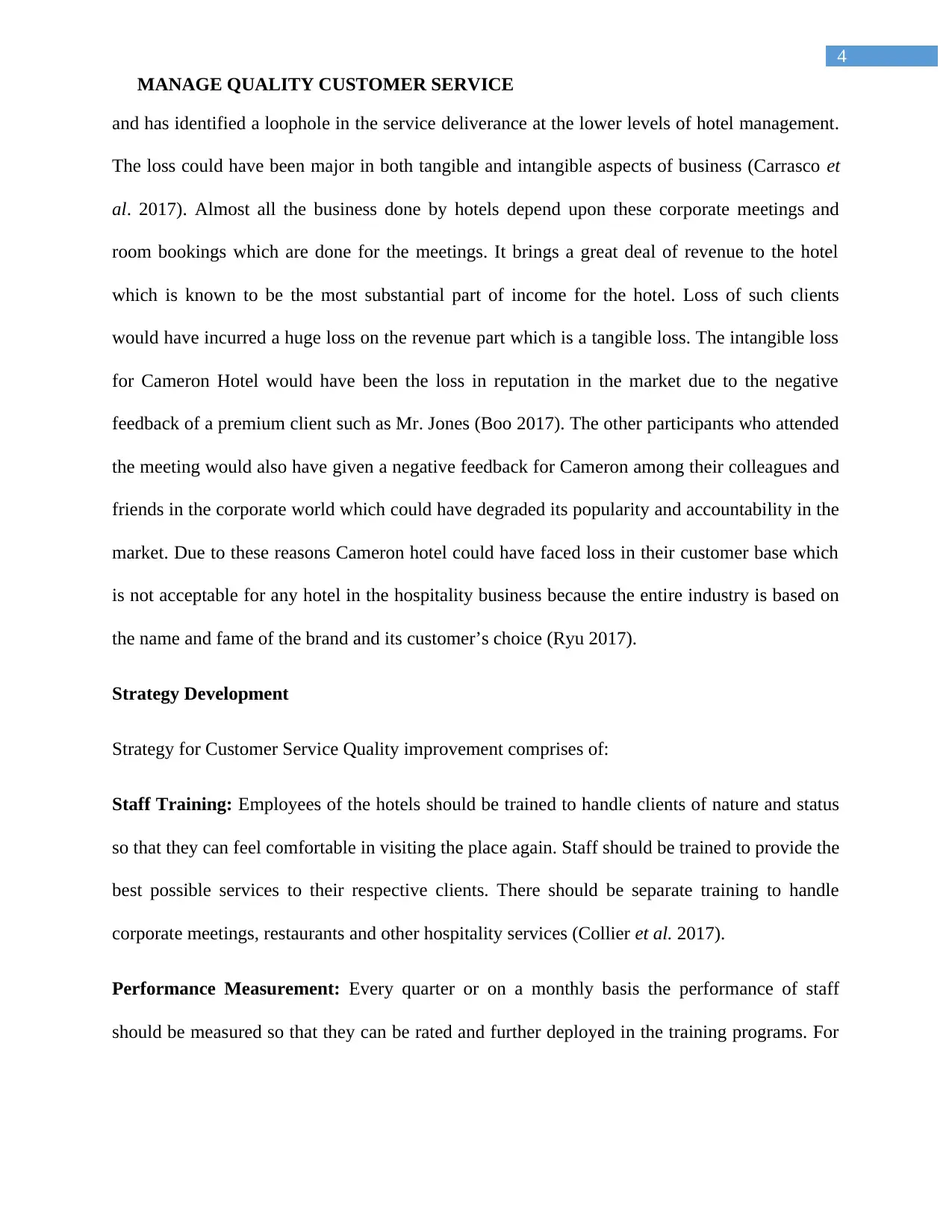
4
MANAGE QUALITY CUSTOMER SERVICE
and has identified a loophole in the service deliverance at the lower levels of hotel management.
The loss could have been major in both tangible and intangible aspects of business (Carrasco et
al. 2017). Almost all the business done by hotels depend upon these corporate meetings and
room bookings which are done for the meetings. It brings a great deal of revenue to the hotel
which is known to be the most substantial part of income for the hotel. Loss of such clients
would have incurred a huge loss on the revenue part which is a tangible loss. The intangible loss
for Cameron Hotel would have been the loss in reputation in the market due to the negative
feedback of a premium client such as Mr. Jones (Boo 2017). The other participants who attended
the meeting would also have given a negative feedback for Cameron among their colleagues and
friends in the corporate world which could have degraded its popularity and accountability in the
market. Due to these reasons Cameron hotel could have faced loss in their customer base which
is not acceptable for any hotel in the hospitality business because the entire industry is based on
the name and fame of the brand and its customer’s choice (Ryu 2017).
Strategy Development
Strategy for Customer Service Quality improvement comprises of:
Staff Training: Employees of the hotels should be trained to handle clients of nature and status
so that they can feel comfortable in visiting the place again. Staff should be trained to provide the
best possible services to their respective clients. There should be separate training to handle
corporate meetings, restaurants and other hospitality services (Collier et al. 2017).
Performance Measurement: Every quarter or on a monthly basis the performance of staff
should be measured so that they can be rated and further deployed in the training programs. For
MANAGE QUALITY CUSTOMER SERVICE
and has identified a loophole in the service deliverance at the lower levels of hotel management.
The loss could have been major in both tangible and intangible aspects of business (Carrasco et
al. 2017). Almost all the business done by hotels depend upon these corporate meetings and
room bookings which are done for the meetings. It brings a great deal of revenue to the hotel
which is known to be the most substantial part of income for the hotel. Loss of such clients
would have incurred a huge loss on the revenue part which is a tangible loss. The intangible loss
for Cameron Hotel would have been the loss in reputation in the market due to the negative
feedback of a premium client such as Mr. Jones (Boo 2017). The other participants who attended
the meeting would also have given a negative feedback for Cameron among their colleagues and
friends in the corporate world which could have degraded its popularity and accountability in the
market. Due to these reasons Cameron hotel could have faced loss in their customer base which
is not acceptable for any hotel in the hospitality business because the entire industry is based on
the name and fame of the brand and its customer’s choice (Ryu 2017).
Strategy Development
Strategy for Customer Service Quality improvement comprises of:
Staff Training: Employees of the hotels should be trained to handle clients of nature and status
so that they can feel comfortable in visiting the place again. Staff should be trained to provide the
best possible services to their respective clients. There should be separate training to handle
corporate meetings, restaurants and other hospitality services (Collier et al. 2017).
Performance Measurement: Every quarter or on a monthly basis the performance of staff
should be measured so that they can be rated and further deployed in the training programs. For
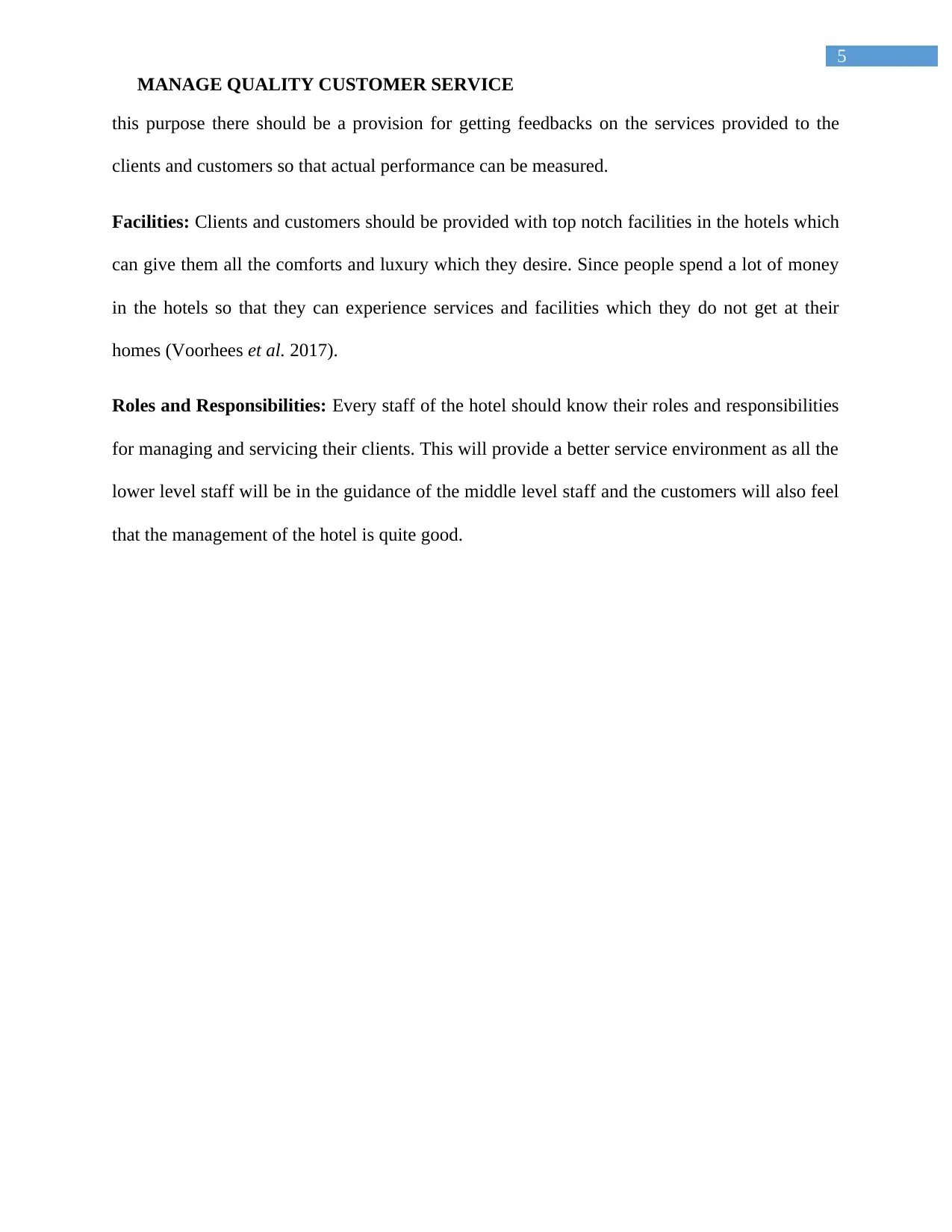
5
MANAGE QUALITY CUSTOMER SERVICE
this purpose there should be a provision for getting feedbacks on the services provided to the
clients and customers so that actual performance can be measured.
Facilities: Clients and customers should be provided with top notch facilities in the hotels which
can give them all the comforts and luxury which they desire. Since people spend a lot of money
in the hotels so that they can experience services and facilities which they do not get at their
homes (Voorhees et al. 2017).
Roles and Responsibilities: Every staff of the hotel should know their roles and responsibilities
for managing and servicing their clients. This will provide a better service environment as all the
lower level staff will be in the guidance of the middle level staff and the customers will also feel
that the management of the hotel is quite good.
MANAGE QUALITY CUSTOMER SERVICE
this purpose there should be a provision for getting feedbacks on the services provided to the
clients and customers so that actual performance can be measured.
Facilities: Clients and customers should be provided with top notch facilities in the hotels which
can give them all the comforts and luxury which they desire. Since people spend a lot of money
in the hotels so that they can experience services and facilities which they do not get at their
homes (Voorhees et al. 2017).
Roles and Responsibilities: Every staff of the hotel should know their roles and responsibilities
for managing and servicing their clients. This will provide a better service environment as all the
lower level staff will be in the guidance of the middle level staff and the customers will also feel
that the management of the hotel is quite good.
⊘ This is a preview!⊘
Do you want full access?
Subscribe today to unlock all pages.

Trusted by 1+ million students worldwide
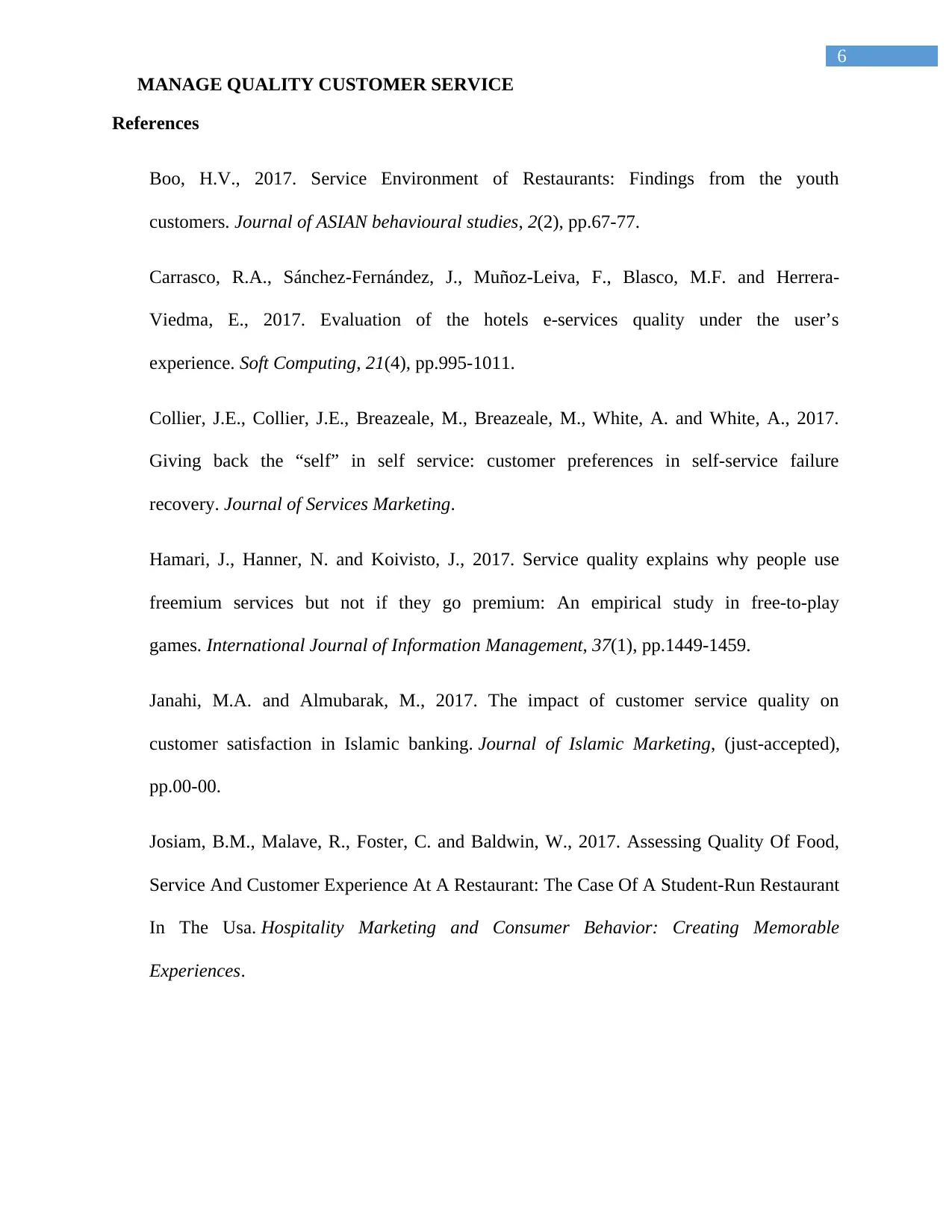
6
MANAGE QUALITY CUSTOMER SERVICE
References
Boo, H.V., 2017. Service Environment of Restaurants: Findings from the youth
customers. Journal of ASIAN behavioural studies, 2(2), pp.67-77.
Carrasco, R.A., Sánchez-Fernández, J., Muñoz-Leiva, F., Blasco, M.F. and Herrera-
Viedma, E., 2017. Evaluation of the hotels e-services quality under the user’s
experience. Soft Computing, 21(4), pp.995-1011.
Collier, J.E., Collier, J.E., Breazeale, M., Breazeale, M., White, A. and White, A., 2017.
Giving back the “self” in self service: customer preferences in self-service failure
recovery. Journal of Services Marketing.
Hamari, J., Hanner, N. and Koivisto, J., 2017. Service quality explains why people use
freemium services but not if they go premium: An empirical study in free-to-play
games. International Journal of Information Management, 37(1), pp.1449-1459.
Janahi, M.A. and Almubarak, M., 2017. The impact of customer service quality on
customer satisfaction in Islamic banking. Journal of Islamic Marketing, (just-accepted),
pp.00-00.
Josiam, B.M., Malave, R., Foster, C. and Baldwin, W., 2017. Assessing Quality Of Food,
Service And Customer Experience At A Restaurant: The Case Of A Student-Run Restaurant
In The Usa. Hospitality Marketing and Consumer Behavior: Creating Memorable
Experiences.
MANAGE QUALITY CUSTOMER SERVICE
References
Boo, H.V., 2017. Service Environment of Restaurants: Findings from the youth
customers. Journal of ASIAN behavioural studies, 2(2), pp.67-77.
Carrasco, R.A., Sánchez-Fernández, J., Muñoz-Leiva, F., Blasco, M.F. and Herrera-
Viedma, E., 2017. Evaluation of the hotels e-services quality under the user’s
experience. Soft Computing, 21(4), pp.995-1011.
Collier, J.E., Collier, J.E., Breazeale, M., Breazeale, M., White, A. and White, A., 2017.
Giving back the “self” in self service: customer preferences in self-service failure
recovery. Journal of Services Marketing.
Hamari, J., Hanner, N. and Koivisto, J., 2017. Service quality explains why people use
freemium services but not if they go premium: An empirical study in free-to-play
games. International Journal of Information Management, 37(1), pp.1449-1459.
Janahi, M.A. and Almubarak, M., 2017. The impact of customer service quality on
customer satisfaction in Islamic banking. Journal of Islamic Marketing, (just-accepted),
pp.00-00.
Josiam, B.M., Malave, R., Foster, C. and Baldwin, W., 2017. Assessing Quality Of Food,
Service And Customer Experience At A Restaurant: The Case Of A Student-Run Restaurant
In The Usa. Hospitality Marketing and Consumer Behavior: Creating Memorable
Experiences.
Paraphrase This Document
Need a fresh take? Get an instant paraphrase of this document with our AI Paraphraser
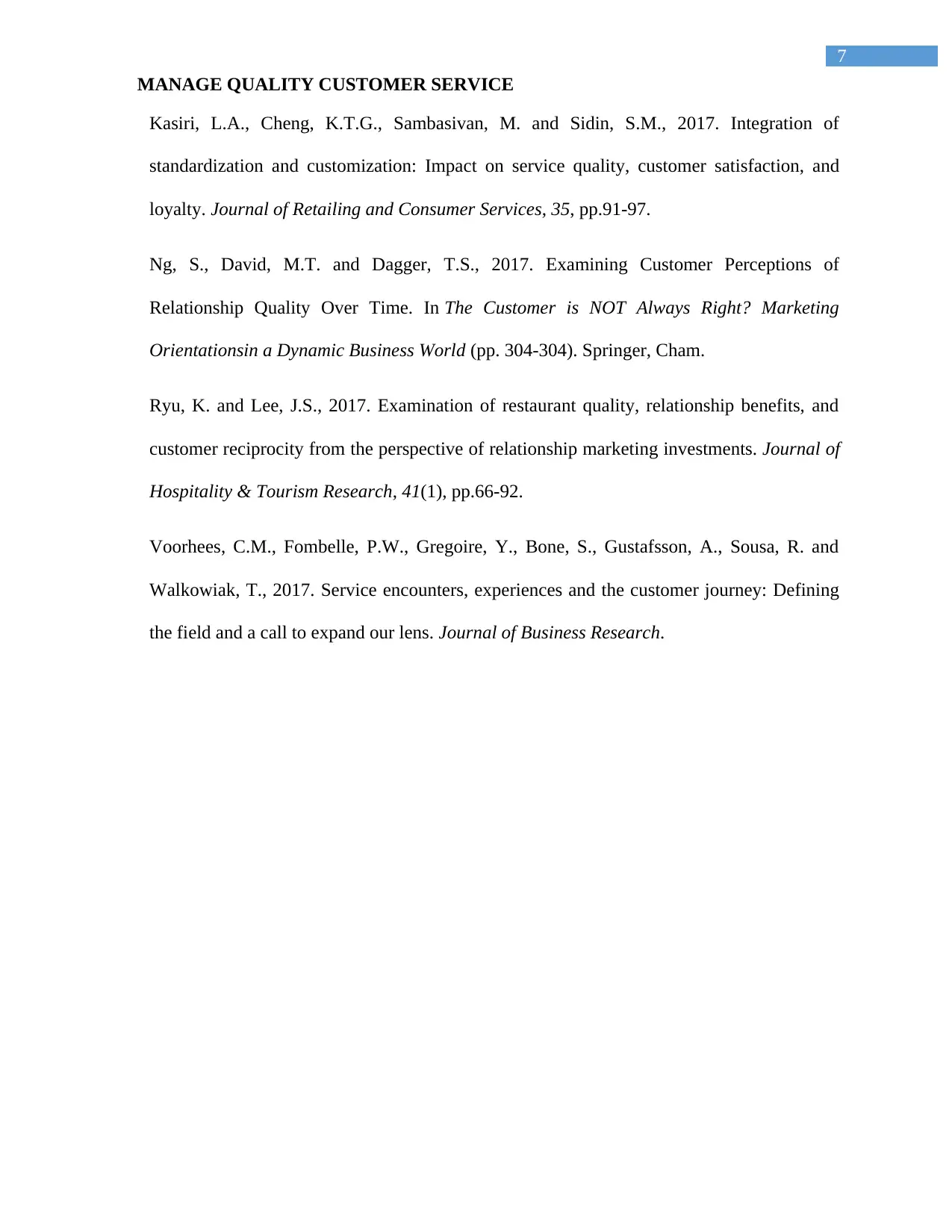
7
MANAGE QUALITY CUSTOMER SERVICE
Kasiri, L.A., Cheng, K.T.G., Sambasivan, M. and Sidin, S.M., 2017. Integration of
standardization and customization: Impact on service quality, customer satisfaction, and
loyalty. Journal of Retailing and Consumer Services, 35, pp.91-97.
Ng, S., David, M.T. and Dagger, T.S., 2017. Examining Customer Perceptions of
Relationship Quality Over Time. In The Customer is NOT Always Right? Marketing
Orientationsin a Dynamic Business World (pp. 304-304). Springer, Cham.
Ryu, K. and Lee, J.S., 2017. Examination of restaurant quality, relationship benefits, and
customer reciprocity from the perspective of relationship marketing investments. Journal of
Hospitality & Tourism Research, 41(1), pp.66-92.
Voorhees, C.M., Fombelle, P.W., Gregoire, Y., Bone, S., Gustafsson, A., Sousa, R. and
Walkowiak, T., 2017. Service encounters, experiences and the customer journey: Defining
the field and a call to expand our lens. Journal of Business Research.
MANAGE QUALITY CUSTOMER SERVICE
Kasiri, L.A., Cheng, K.T.G., Sambasivan, M. and Sidin, S.M., 2017. Integration of
standardization and customization: Impact on service quality, customer satisfaction, and
loyalty. Journal of Retailing and Consumer Services, 35, pp.91-97.
Ng, S., David, M.T. and Dagger, T.S., 2017. Examining Customer Perceptions of
Relationship Quality Over Time. In The Customer is NOT Always Right? Marketing
Orientationsin a Dynamic Business World (pp. 304-304). Springer, Cham.
Ryu, K. and Lee, J.S., 2017. Examination of restaurant quality, relationship benefits, and
customer reciprocity from the perspective of relationship marketing investments. Journal of
Hospitality & Tourism Research, 41(1), pp.66-92.
Voorhees, C.M., Fombelle, P.W., Gregoire, Y., Bone, S., Gustafsson, A., Sousa, R. and
Walkowiak, T., 2017. Service encounters, experiences and the customer journey: Defining
the field and a call to expand our lens. Journal of Business Research.
1 out of 8
Related Documents
Your All-in-One AI-Powered Toolkit for Academic Success.
+13062052269
info@desklib.com
Available 24*7 on WhatsApp / Email
![[object Object]](/_next/static/media/star-bottom.7253800d.svg)
Unlock your academic potential
Copyright © 2020–2025 A2Z Services. All Rights Reserved. Developed and managed by ZUCOL.





